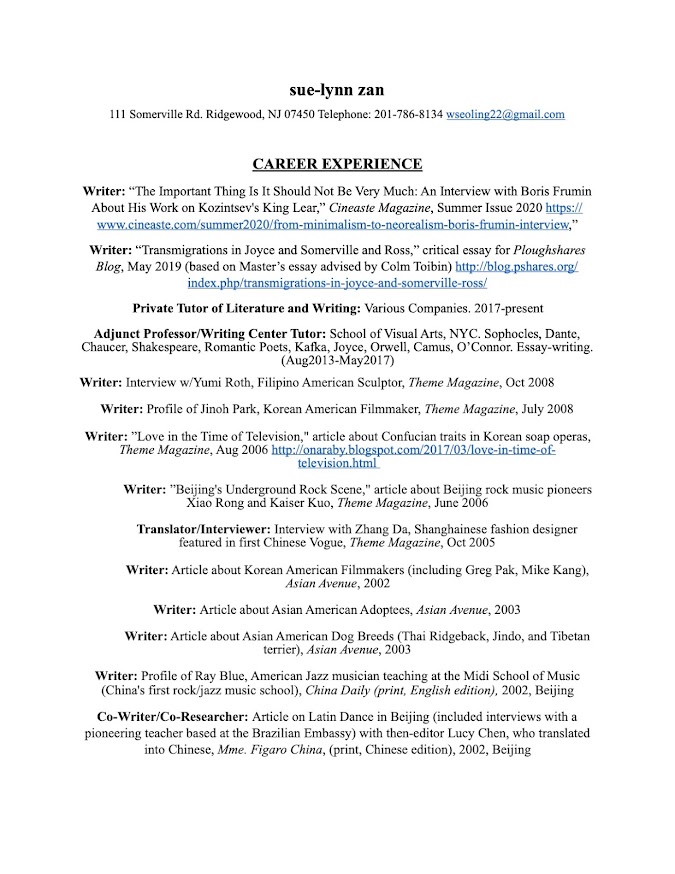Tianshu Liu on Joyce's "Araby"/Spring 2017
Tianshu Liu
The Light
“Araby” is a story about the imaginary world of reality, and
disillusionment. It’s also about a necessary stage in every person’s life
which makes us become more mature. The name Araby
is derived from ”Arabia”, meaning the fantasy Europeans had about the Middle
East during the Age of Discovery, in which there is countless gold in every
inch of land. Similarly, the boy projects this kind of fantasy towards his
friend Mangan's sister. Not surprisingly, both situations meet the same ending: just like it says in the Bible’s “Ecclesiastes”, all is vanity.
The story provides much food for
thought. Aside from the name, the description of lights also has its own
specific function. Sometimes it is used to serve as a metaphor for the boy’s
feelings in the story. James Joyce took advantage of a scene to drop subtle hints about the
feeling and emotion of the character in the story. He used his sensitivity to
reveal psychological activities through environment; sometimes light becomes
another embodiment of the social background. It represents the atmosphere under
the control of religious values. Light shows that under the hold of asceticism,
people cannot face their normal desires and affection naturally.
In the beginning of the story, when
children are playing in the street, “The space of sky above us was the colour
of ever-changing violet and towards it the lamps of the street lifted their
feeble lanterns”. The color violet is romantic and full of ambiguities, showing
how the boy feels about Mangan's sister. Everything is uncertain, just like the
ever-changing color. The young boy is so full of imagination about everything they
can do together, he doesn’t realize the love he believes in is just an
illusion. It has such a mysterious beauty that it makes him ignore the danger
or frustration it can bring in the end. Natural light is the embodiment of
human natural affection between two people. On the other hand, the artificial
light of the street looks restricted, just like religious restraints. In
contrast to the natural light, Joyce uses the word “feeble” to describe the lamps - because religious restraint can never defeat innate feelings of love; no one
can restrain it.
Similarly, there is another part in
the story that uses artificial light, as well as narrow space, to create a
sense of oppression. “When
we returned to the street, light from the kitchen windows had filled the areas.” That’s the window through which
the boy always secretly observes Mangan's sister. All the feelings are crowded in his heart just
like all the light in that little kitchen, yet the kitchen cannot hold all the
light inside.
Sometimes
light becomes the embodiment of Mangan's sister’s sanctity which is built up in his own mind in an ascetic social environment. “Or if Mangan's sister came out on
the doorstep to call her brother in to his tea, we watched her from our shadow
peer up and down the street.” Light is holy in the same way the boy
thinks of Mangan's sister and love. In that dark and cold night, the girl was
lit up by the light, like a goddess in the boy’s heart. Later when she told him
about Araby, “The light from
the lamp opposite our door caught the white curve of her neck, lit up her hair
that rested there and, falling, lit up the hand upon the railing. It fell over
one side of her dress and caught the white border of a petticoat, just visible
as she stood at ease.” We can tell the boy’s
restrained desire from the description of her body. However, the whole scene is
so full of Christian
overtones; the light and a hand are two most
important symbols in that image. It reminds me of classical religious
paintings. When this kind of admiration rises to the heights of
religion, the boy becomes a devout believer in Mangan's sister. “Her name
sprang to my lips at moments in strange prayers and praises which I myself did
not understand. My eyes were often full of tears (I could not tell why) and at
times a flood from my heart seemed to pour itself out into my bosom”… “Some distant lamp or lighted window gleamed below me. I was thankful
that I could see so little. All my senses seemed to desire to veil
themselves and, feeling that I was about to slip from them, I pressed the palms
of my hands together until they trembled, murmuring: "O love! O love!'
many times.”
Light as imagery runs through the
whole story. “Gazing up into the darkness I saw myself as a creature driven and
derided by vanity; and my eyes burned with anguish and anger.” In the end, he
finally gets to the bazaar with so little money that he can hardly buy anything;
an intangible, frustrated feeling fills up his heart and he suddenly
understands nothing is ever going to happen. The lights of Araby are turned
off, just like the illusion in the boy’s heart. His desperation is just like
this silent darkness and at the same time he starts to feel a kind of unknown
anger; there is no light anymore, just a pathetic heart.

Comments
Post a Comment